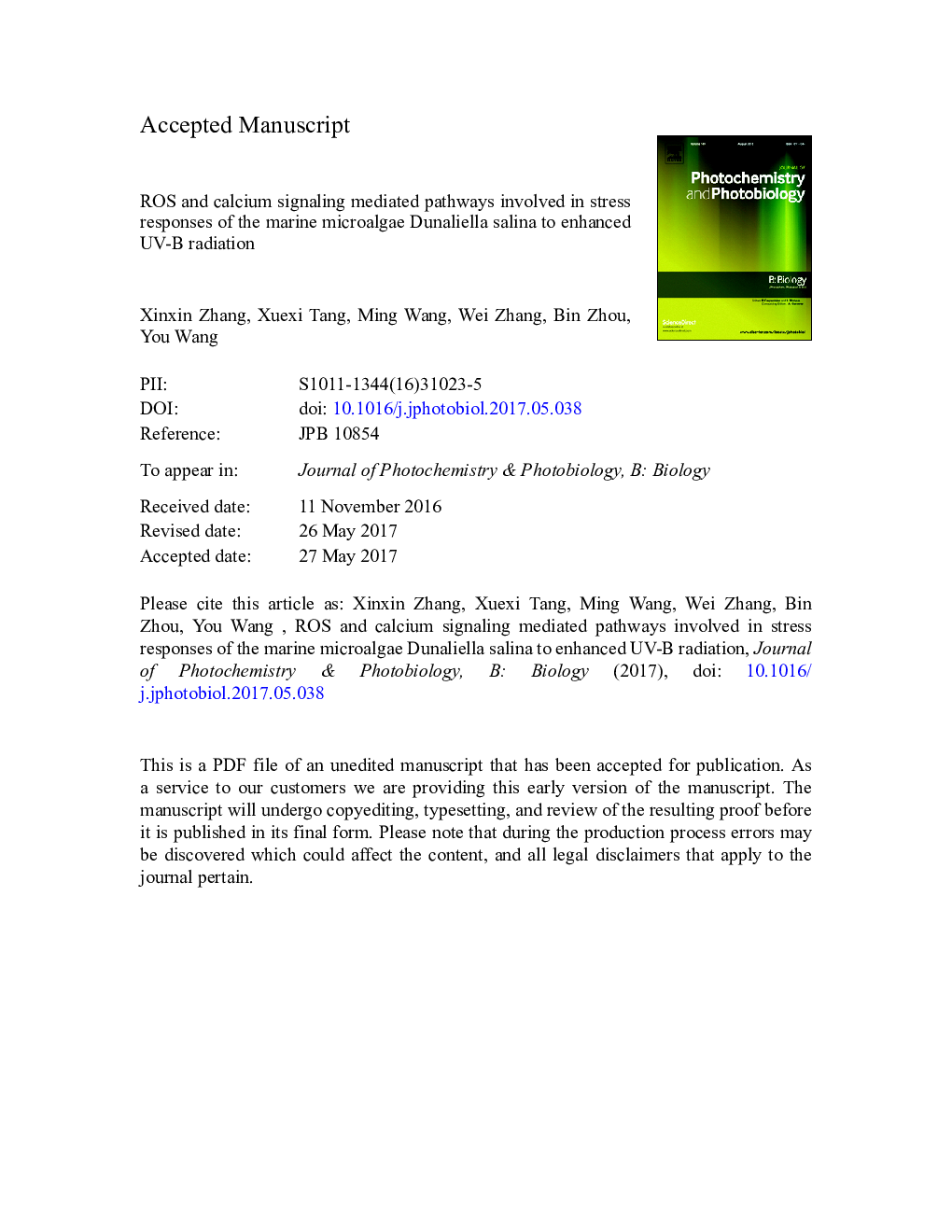| کد مقاله | کد نشریه | سال انتشار | مقاله انگلیسی | نسخه تمام متن |
|---|---|---|---|---|
| 4754397 | 1418060 | 2017 | 39 صفحه PDF | دانلود رایگان |
عنوان انگلیسی مقاله ISI
ROS and calcium signaling mediated pathways involved in stress responses of the marine microalgae Dunaliella salina to enhanced UV-B radiation
دانلود مقاله + سفارش ترجمه
دانلود مقاله ISI انگلیسی
رایگان برای ایرانیان
کلمات کلیدی
موضوعات مرتبط
مهندسی و علوم پایه
مهندسی شیمی
بیو مهندسی (مهندسی زیستی)
پیش نمایش صفحه اول مقاله

چکیده انگلیسی
UV-B ray has been addressed to trigger common metabolic responses on marine microalgae, however, the upstream events responsible for these changes in marine microalgae are poorly understood. In the present study, a species of marine green microalgae Dunaliella salina was exposed to a series of enhanced UV-B radiation ranging from 0.25 to 1.00 KJ·mâ 2 per day. The role of ROS and calcium signaling in the D. salina responses to UV-B was discussed. Results showed that enhanced UV-B radiation markedly decreased the cell density in a dose-dependent manner, but the contents of protein and glycerol that were essential for cell growth increased. It suggested that it was cell division instead of cell growth that UV-B exerted negative effects on. The subcellular damages on nuclei and plasmalemma further evidenced the hypothesis. The nutrient absorption was affected with UV-B exposure, and the inhibition on PO43 â uptake was more serious compared to NO3â uptake. UV-B radiation promoted reactive oxygen species (ROS) formation and thiobarbituric acid reactive substances (TBARS) contents, decreased the redox status and altered the antioxidant enzyme activities. The addition of the ROS scavenger and the glutathione biosynthesis precursor N-acetyl-l-cysteine (NAC) alleviated the stress degree, implying ROS-mediated pathway was involved in the stress response to UV-B radiation. Transient increase in Ca2 +-ATPase was triggered simultaneously with UV-B exposure. Meanwhile, the addition of an intracellular free calcium chelator aggravated the damage of cell division, but exogenous calcium and ion channel blocker applications did not, inferring that endogenously initiated calcium signaling played roles in response to UV-B. Cross-talk analysis showed a relatively clear relationship between ROS inhibition and Ca2 +-ATPase suppression, and a relation between Ca2 + inhibition and GPx activity change was also observed. It was thus presumed that ROS-coupled calcium signaling via the glutathione cycle was involved in the response of marine microalgae to UV-B stimuli.
ناشر
Database: Elsevier - ScienceDirect (ساینس دایرکت)
Journal: Journal of Photochemistry and Photobiology B: Biology - Volume 173, August 2017, Pages 360-367
Journal: Journal of Photochemistry and Photobiology B: Biology - Volume 173, August 2017, Pages 360-367
نویسندگان
Xinxin Zhang, Xuexi Tang, Ming Wang, Wei Zhang, Bin Zhou, You Wang,